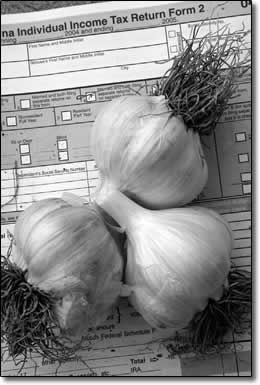
Tears in the rain
by Chef Boy Ari

by Chef Boy Ari
As our world continues its journey around the sun, the earthly seasons fly by like tears in the rain. Harvest season, hunting season, holiday season, ski season, mud season and now - speaking of tears in the rain - it's tax season.
These days, taxes are paid in money, but it was not always this way. Long before the concept of monetary units, societies all over the world had systems by which citizens forfeited a portion of their productivity to the government, and this productivity was used - allegedly - for the good of the entire community.
Consider the Great Wall of China, much of the labor for which was provided by poor citizens who paid off their annual debt to the government with hard labor. In return, they received the benefit of protection that the wall afforded from would-be conquerors. Similarly, the Inca had a labor tax called the Mit'a, with which they built an astounding network of roads through the Andes.
Farmers, not surprisingly, have often paid their taxes in produce. The Aztec ruler Montezuma was reputed to have had quite a stockpile of amaranth, the Aztec sacred grain, which he collected as tax. And all around the world throughout history, as farmers were taxed in food, so were fishermen taxed in fish, salt traders taxed in salt, and herders taxed in livestock. Sparta allegedly had a system by which all members of a household, including slaves and cattle, had to fast for a day and give the government what they would have eaten.
Even after the concept of money began circulating, food often remained an acceptable substitute. Case in point: Siberia, where well into the 19th century, people were allowed to pay their taxes in garlic.
From this, we can infer that tax time in Siberia was not April 15. If it were, that would be too good to be true for the farmers. By April 15, the bulbs don't have a lot of storage time - and thus, value - left in them, and the new crop is crawling from the ground, soon to be harvested.
While some may wonder what the Siberian government did with all of that garlic, my own travels in Siberia confirm the logic of accepting food over money. When you're in Siberia, you're really out there, often a long way from most opportunities to purchase things. Consequently, Siberians are adept at getting what they need from their immediate surroundings, resulting in some of the finest food I've ever had, including fried trout, pickled mushrooms, buttered caviar, fresh bread and an endless array of soups and salads. Money, meanwhile, begins to resemble more and more what it really is: little pieces of paper with zero practical application and no intrinsic value unless there is somebody else around who values it - and has something that you want. But let's face it, in the middle of the long Siberian winter, you can't eat money, but you can sure eat garlic.
Siberia is where I learned two of the most important things I know about food: Eat pickles with every meal, and, if you are lucky enough to have it, put mayo on everything.
Which brings me to this week's recipe - imported all the way from Siberia. I call it: "Yet another thing to put mayo on." It's a simple dish, but it's one that is in season right now, made from entirely local ingredients, providing that you grew them last summer and stored them appropriately.All you need is garlic and carrots. All you do is grate them up - the finer the better - and mix them together with a little salt. Most people choose to mix a small amount of garlic relative to the amount of carrot. But within this general rule, I'll leave the exact ratio to your own taste.This dish is useful to have around and add to things, or eat along with things. A mouthful of fried trout, for example, goes well with some of this, as do pickles.Or toss some of this mixture in some hot bacon grease, with onions, and build on it to make fried rice or stir-fry. Don't forget to put mayo on top.
Southern Siberia is thought by horticulturists as likely to be where the domestication of garlic took place. Perhaps this origin story explains garlic's value to the Siberians, analogous to the value that the Aztecs placed on amaranth, the grain that they domesticated.
Either way, my accountant has advised me that the U.S. government will not accept my tax payment in garlic, even though he likes my garlic very much. I suppose this means that any refund I get will not be in garlic. But unlike Uncle Sam, my accountant does accept partial payment in vitamin G-spot.
Yes, the barter system remains alive and well - a viable option between any two willing parties. And the more you barter for your sustenance and services, the fewer taxes you pay.
|